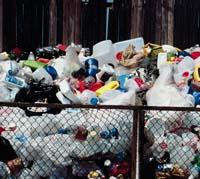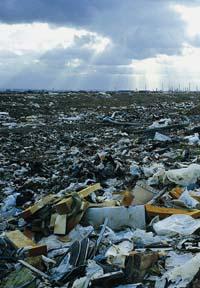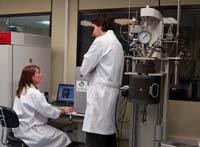Break of polymers

Together with the development of plastic materials, the use has increased considerably, and currently plastics are used for the manufacture of all types of components and consumer products in sectors as diverse as packaging and packaging, automotive, electrical and electronic sectors, textiles, construction, etc.
The correct management of the waste of these products is important. The material and energy contained in these wastes can be used, but currently the level of use is insufficient and is far from the objectives set by the community environmental regulations. These regulations are becoming stricter.
Although 50% and 40% of plastics are recovered from the waste generated in agriculture and urban solid waste, in the construction this figure is 9%, in automotive it does not reach 7% and in the electric and electronic sector only recovers 4%, according to data from the APME (European Association of Plastics Manufacturers). And in 2003, 61% of the plastic waste in Western Europe went directly to landfills.
Therefore, it is necessary to increase the recycling and valorization of waste of plastic materials. Therefore, it is necessary to expand the applications of conventional recycling procedures, as well as develop more advanced technologies such as chemical recycling.
Currently, mechanical recycling is the most used, but it has some problems. To achieve a good quality product it is necessary to have separate, clean and in large quantities different types of plastics. But in the waste plastics are usually mixed and accompanied by other components. Think about the amount of plastics that can exist in household garbage. In a plastic bottle, for example, the bottle and lids are different and should be separated. Finally, the products resulting from mechanical recycling are of low quality and low value in the market.

Chemical recycling, however, although it is still in the phase of experimentation, can solve these problems. This is due, on the one hand, to the fact that it is not necessary to differentiate the different types of plastics and, on the other, to obtain a high quality product.
Recovering original components
Plastics are based on polymers, long chains of a monomer or molecule. In addition to polymers, they can contain several additives. Well, in chemical recycling, through different processes, these polymers break or break down. As a consequence, minor components are obtained, from oils or basic monomers to mixtures of compounds - mainly hydrocarbons -. The first are raw materials that serve to remanufacture plastics and the second can be used as fuel to obtain energy.
The most important processes for the break of polymers are chemical depolymerization, gasification, thermal decomposition (pyrolysis and thermal cracking), catalytic thermal decomposition and its use as reducing agents of high furnaces.
Chemical depolymerization can only be used with polymers obtained in a certain form (condensation). It consists of chemical decomposition, obtaining the original molecules that formed the polymer. In gasification the material is burned at high temperature and controlled. In this way, organic matter is transformed into synthesis gas (mainly CO+H 2, CO 2, CH 4, etc. ). The inorganic components of the material remain as vitrified inert waste of difficult use.
In thermal decomposition, for example by pyrolysis and thermal cracking, polymer chains are broken at high temperature and without oxygen. In catalytic thermal decomposition, in addition to temperatures, a catalyst or other agents such as hydrogen are involved. These processes allow obtaining monomers and fractions of multifunctional hydrocarbons.

Finally, plastic waste can be used as reducing agents in blast furnaces. The final product obtained can be used to melt in ingots and manufacture steel.
Development of new technologies
The GAIKER-IK4 Recycling and Valorization Area has launched a new project to purchase state-of-the-art equipment for the development of this technology: REQUIPLAST. The main objective of the project is to establish the technological base for the development of chemical depolymerization and low temperature pyrolysis. These processes can be an opportunity for those plastic waste that at this time require a viable solution, such as polyester coming from textile, polyamide and polyurethane waste from off-duty vehicles and packaging PET.





